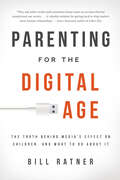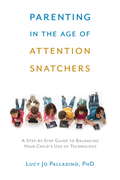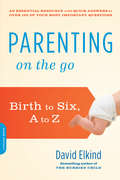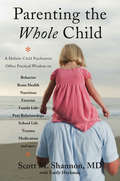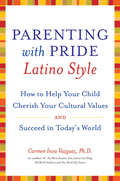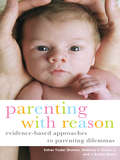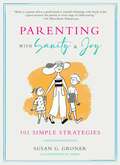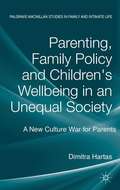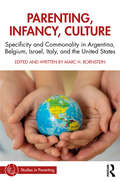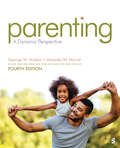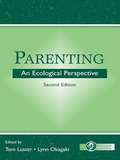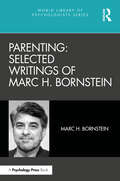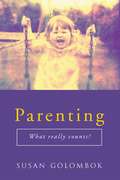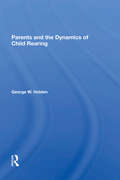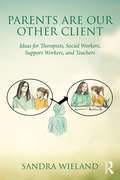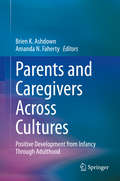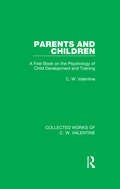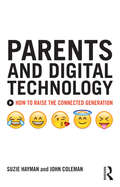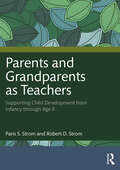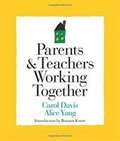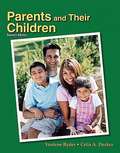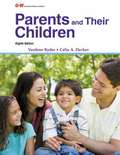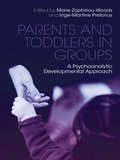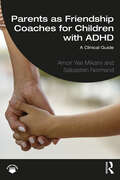- Table View
- List View
Parenting for the Digital Age: The Truth Behind Media's Effect on Children and What to Do About It
by Bill RatnerFrom how to deal with cyberbullying to the strange, true stories behind Barbie and G.I. Joe, media insider Bill Ratner takes an inside look at our wired-up world in a fascinating book--part memoir, part parenting guide--for the digital age. Landing his first job in advertising at age fourteen, Ratner learned early that the media doesn't necessarily have our best interests at heart. His career as one of America's most popular voiceover artists and his life as a parent and educator gives readers a first-hand look at the effects of digital media on children and what you can do about it.
Parenting in the Age of Attention Snatchers: A Step-by-Step Guide to Balancing Child's Use of Technology
by Lucy Jo PalladinoAre your kids glued to their screens? Here is a practical, step-by-step guide that gives parents the tools to teach children, from toddlers to teens, how to gain control of their technology use. As children spend more of their time on tablets and smartphones, using apps specially engineered to capture their attention, parents are becoming concerned about the effects of so much technology use--and they feel powerless to intervene. They want their kids to be competent and competitive in their use of technology, but they also want to prevent the attention and behavioral problems that can develop from overuse.In this guide, Lucy Jo Palladino doesn't demonize technology; instead she gives parents the tools to help children understand and control their attention--and to recognize and resist when their attention is being "snatched." Palladino's straightforward, evidence-based approach applies to kids of all ages. Parents will also learn the critical difference between voluntary and involuntary attention, new findings about brain development, and what puts children at risk for attention disorders.
Parenting on the Go: Birth to Six, A to Z
by David ElkindEssential parenting advice from one of today's leading psychologists, at your fingertips What is the most treasured resource for families with young children? Time. Between keeping house, shopping, doing chores, and getting everyone to work and school-let alone fitting in family meals, fun activities, and much-needed downtime-being a parent can require major feats of scheduling. While parents don't always have hours to pore over parenting books, they could use short, to-the-point advice on the challenges they confront every day. Now, for today's busy families, child-development expert and bestselling author David Elkind offers Parenting on the Go: an authoritative, accessible guide for parents of infants and young children. Elkind has long been praised for his timely, resonant responses to key child-rearing issues. Here, with characteristic insight and comforting sensibility, he offers practical answers to more than 100 common parenting questions, on topics from A to Z, including: Attention Deficit Disorders Back-to-School Blues Child-Proofing the Computer Empathy in Children Homework Manners and Morals Only Children Sibling Rivalry Time-Outs and much more.
Parenting the Whole Child: A Holistic Child Psychiatrist Offers Practical Wisdom on Behavior, Brain Health, Nutrition, Exercise, Family Life, Peer Relationships, School Life, Trauma, Medication, and More . . .
by Emily Heckman Scott M. ShannonUnderstanding child health and wellness through a holistic lens. Complementing his book for professionals, here Scott Shannon equips parents and caregivers with a better way to understand the mental health challenges their children face, including how cutting-edge scientific concepts like epigenetics and neuroplasticity mean new hope for overcoming them. Readers learn how the most common stressors in kids--inadequate nutrition, unaddressed trauma, learning problems, family relationships, and more--are often at the root of behavioral and emotional issues, and what steps can be taken to restore health and wholeness, without immediately turning to medication.
Parenting with Pride Latino Style
by Carmen Inoa VazquezFrom a distinguished psychologist, mother, and Latina, Parenting with Pride Latino Style offers the first bicultural child-rearing approach for Latino parents. This groundbreaking book supports families in raising their children with time-honored Hispanic values while incorporating the best that North America has to offer. Dr. Vazquez's unique parenting method, the New Traditionalism (El Nuevo Tradicionalismo), preserves classic Latino ideals, such as pride, family loyalty, and courtesy, while helping parents revise their traditional authoritarian child-rearing style, blending the best of Latino and American cultures and dramatically reducing cultural conflict in the family. Her seven steps to successful parenting are grounded in the acronym ORGULLO ("pride"): O: Organize your feelings R: Respect your child's feelings G: Guide and teach your child; do not dictate U: Update your media awareness often L: Love your child for who she or he is L: Listen to your child O: Open the communication channels -- and keep them open Self-assessments and reflection exercises help parents resolve the dilemmas produced when two cultures combine. Detailed examples show how to use these methods immediately in daily life -- from family relationships to children's friendships to school issues. Clear, compassionate, and based on Dr. Vazquez's personal experience as a Latina professional and parent, Parenting with Pride Latino Style is the one book that enables contemporary Latino parents to pass on their rich cultural heritage to their children -- and to future generations as well.
Parenting with Reason: Evidence-Based Approaches to Parenting Dilemmas (Parent and Child)
by Esther Yoder Strahan Wallace E. Dixon, Jr. J. Burton BanksSometimes it feels as though everybody has an opinion on how you should bring up your child – and no two people seem to agree on how it should be done for the best! Parenting with Reason cuts through the masses of confusing and often contradictory advice about parenting by providing hard evidence to back up the tough decisions all parents face. Unlike many self-help guides to parenting which are based on the opinion of one author, this book is based on many findings from scientific research, giving you a trustworthy, ‘evidence-based’ guide to help see your way through parenting dilemmas. Written by a clinical psychologist, a developmental psychologist and a doctor of family medicine, the book looks at pressing questions such as: 'What should I do when my child acts up?', 'How can I get my baby to sleep through the night?' and 'How do I begin to toilet-train my child?' The authors, who are also parents themselves, debunk common myths about parenting, such as the notion that a healthy baby needs to be able to breastfeed at will throughout the night, or the idea that children who are adopted need specialized counselling. They also cover issues such as how children might be affected by seeing violence on television, how a parent’s psychological health can affect their child, what the scientific evidence is for and against circumcision, and how divorce and adoption affect a child’s development. The end of each chapter gives you 'The Bottom Line', a handy summary of the key points of each issue. This book is ideal for new or prospective parents, and paediatricians, family health providers and anyone who works with children and their parents will also find the book’s objective, scientific approach useful in their work.
Parenting with Sanity & Joy: 101 Simple Strategy
by Susan G GronerMom&’s Choice Award Winner: A collection of simple, fun, effective tips for excelling at—and enjoying!—parenthood. These readily actionable tips from the founder of The Parenting Mentor not only help resolve everyday problems—they provide a comforting, calming source of wisdom to help you parent with confidence. Find smart advice on: Parenting Golden RulesFamily TimeRules and RespectPerspective and JudgmentGratitude and AttitudeFood and DiningForbidden PhrasesLife SkillsFamily Management &“The most beautiful thing about the advice in this book is that it all comes with a deep wisdom and love based on years of experience, and a positive energy that any kid would want in their parents!&” —Katya Libin, co-founder and CEO of HeyMama
Parenting, Family Policy and Children�s Well-Being in an Unequal Society
by Dimitra HartasThis book examines parenting in an unequal society and questions whether it is a key mechanism through which poverty translates into underachievement and reduced life chances in children.
Parenting, Infancy, Culture: Specificity and Commonality in Argentina, Belgium, Israel, Italy, and the United States (Studies in Parenting Series)
by Marc H. BornsteinThis vital volume advances an in-depth understanding of how parenting infants in the first year of life is similar and different in two contrasting contexts in each of five countries—Argentina, Belgium, Israel, Italy, and the United States—providing a global understanding of parenting across cultures. Edited and written by Marc H. Bornstein and his country collaborators, the chapters presented compare microanalytic approaches to three topical issues in each of two cultural groups in each country. The three issues concern, first, how often and how long mothers in each of the groups in each of the countries engage in basic parenting practices, and how often and how long infants in the same groups engage in different behaviors. Second, whether the maternal parenting practices are organized in any way and whether those infant behaviors are organized in any way. And, third, whether those maternal parenting practices and those infant behaviors are interrelated. Thus, this book offers insights into the basics of parenting and infancy from both intra-cultural and cross-cultural perspectives. Each country chapter is co-authored by a contributor native to the country examined, ensuring an authentic cultural perspectives on parenting and infancy. Together, the chapters provide a broader sample that is more generalizable to a wider range of the world’s population than is typical in most parenting and infancy research. Parenting, Infancy, Culture is essential reading for researchers and students of parenting, psychology, human development, family studies, sociology, and cultural anthropology as well as professionals working with families.
Parenting: A Dynamic Perspective
by George W. Holden Amanda W. HarristGeorge Holden and Amanda Harrist embrace the idea that parenting is a dynamic process: children affect parents just as much as parents affect children. A multi-level, ecological approach to parenting and childrearing allows a full range of parenting styles, covering topics from co-parenting, evolutionary views, human behavioral genetics, to religious influences, and addressing challenges to be encountered across parenting courses, such as family violence, behavior problems, and the role of pathology in the family. The completely updated Parenting: A Dynamic Process, Fourth Edition presents research in a way that is accessible and interesting but also accurate, current, and intellectually rich. Although written from a psychological perspective, views and applications from other disciplines - including sociology, criminology, anthropology, and pediatrics - are also discussed where appropriate. The text discusses contemporary issues, such as fertility problems, daycare, marital conflict, whether or not to use physical punishment, divorce, remarriage and step-parents, LBGTQ parents, the effects of poverty, risks and benefits of media use among children, and family violence. Additionally, Holden and Harrist include selected studies from developing and non-Western countries as well as recent statistics on such topics as US & world birthrate, birth problems, adolescent pregnancy, child injury, divorce and remarriage, child maltreatment, and certain social policy issues.
Parenting: A Dynamic Perspective
by George W. Holden Amanda W. HarristGeorge Holden and Amanda Harrist embrace the idea that parenting is a dynamic process: children affect parents just as much as parents affect children. A multi-level, ecological approach to parenting and childrearing allows a full range of parenting styles, covering topics from co-parenting, evolutionary views, human behavioral genetics, to religious influences, and addressing challenges to be encountered across parenting courses, such as family violence, behavior problems, and the role of pathology in the family. The completely updated Parenting: A Dynamic Process, Fourth Edition presents research in a way that is accessible and interesting but also accurate, current, and intellectually rich. Although written from a psychological perspective, views and applications from other disciplines - including sociology, criminology, anthropology, and pediatrics - are also discussed where appropriate. The text discusses contemporary issues, such as fertility problems, daycare, marital conflict, whether or not to use physical punishment, divorce, remarriage and step-parents, LBGTQ parents, the effects of poverty, risks and benefits of media use among children, and family violence. Additionally, Holden and Harrist include selected studies from developing and non-Western countries as well as recent statistics on such topics as US & world birthrate, birth problems, adolescent pregnancy, child injury, divorce and remarriage, child maltreatment, and certain social policy issues.
Parenting: An Ecological Perspective (Monographs in Parenting Series)
by Tom Luster Lynn OkagakiParenting: An Ecological Perspective was originally created in 1993 to answer questions such as: Why do parents differ markedly in the ways in which they care for their children? What factors contribute to individual differences in parenting behavior? The framework used for addressing these questions is the ecological perspective developed by Urie Bronfenbrenner, who recognized that children's development is influenced by the interactions that they have over time with the people, objects, and symbols in their immediate environment.Luster and Okagaki have updated the original text focusing on parental behavior and also included 6 new chapters covering topics such as:*fathers/gender of parent;*children with special needs;*ethnicity and socioeconomic status; and*parent education.The text summarizes the latest research on factors that influence parenting, with each chapter providing a look at one important influence and the linkages among these various factors. An ecological perspective draws attention to the fact that the lives of parents and children are intertwined, and that understanding factors that influence parents is important for understanding the experiences of children.
Parenting: Selected Writings Of Marc H. Bornstein (World Library of Psychologists)
by Marc H. BornsteinIn the World Library of Psychologists series, international experts present career-long collections of what they judge to be their most interesting publications – extracts from books, key articles, research findings, and practical and theoretical contributions. Marc H. Bornstein has published widely in experimental, methodological, comparative, developmental, and cultural science as well as neuroscience, pediatrics, and aesthetics. In this volume, he has collected an integrated series of his papers on parenting. Many disciplines over many centuries have expounded on parenting, but theory and opinion have prevailed. Bornstein initiated efforts to make parenting an evidence-based field of study through his journal Parenting: Science and Practice, the Handbook of Parenting, and two monograph series, Monographs in Parenting and Studies in Parenting. In addition, Bornstein has undertaken empirical studies that address the determinants, nature, scope, and consequences of parenting. The writings selected for this collection symbolize the development of an empirical parenting science and the meaning and importance of parenting for the lives and well-being of children, parents, and society. Including a specially written introduction, in which Marc Bornstein reflects on the importance of parenting and contextualizes both the field and the evolution of his wide-ranging career, this collection will serve as a valuable resource for students and researchers of parenting, developmental science, and all disciplines from anthropology to zoology concerned with nurturing, socializing, and educating the next generation.
Parenting: What Really Counts?
by Susan GolombokParenting: What Really Counts? examines the scientific evidence on what really matters for children's healthy psychological development.The first section considers whether it is necessary to have two parents, a father present, parents who have a genetic link with their child, or parents who are heterosexual. Section two explores the psychological processes that underlie optimal development for children, particularly the quality of the child's relationship with parents, other family members and the wider social world. Contrary to common assumptions, Susan Golombok concludes that family structure makes little difference to children's day-to-day experiences of life.As well as for students, researchers and teachers, Parenting: What really counts? will be of great interest to parents and those thinking of embarking on a non-traditional route to parenthood. It will also be welcomed by professionals working with families and those involved in the development of family policy.
Parents And The Dynamics Of Child Rearing
by George W HoldenResearch into parent-child relationships is a diverse field of inquiry, attracting investigators from a variety of disciplines and subdisciplines. This book integrates and synthesizes the literature by focusing on issues concerning the parent. The text is organized around four key questions: What determines parental behavior? What are the effects of parenting on children? What makes some parents more effective than others? Why do some parents maltreat their children? George Holden adopts a dynamic rather than a static perspective on parenting. This dynamic approach reflects parents' capacity to modify their behavior as they respond to changes in their children and in their own lives. Throughout the text, historical antecedents as well as methodological and theoretical issues are highlighted. Although the book is designed for advanced courses focusing on the parent child relationship, it also rovides a good overview for those interested in current research concerning parenting.
Parents Are Our Other Client: Ideas for Therapists, Social Workers, Support Workers, and Teachers
by Sandra WielandParents Are Our Other Client: Ideas for Therapists, Social Workers, Support Workers, and Teachers stands out among the vast literature on counseling children and families by finally giving therapists, social workers, support workers, and teachers the tools necessary to work with the single most significant influence on children: the parents. This book: Explains in an accessible and readable format how parenting patterns are learned unconsciously during early childhood and emerge later, when people become parents. Delivers a comprehensive and practical guide for professionals working to help parents see their children differently and change the way they interact with their children. Clarifies why directing attention to the non-verbal areas of a parent’s brain with techniques such as imaging is essential for achieving a shift away from early learned patterns. Examines how a professional's own childhood experience influences the way he or she works with parents and how professionals can shift to more positive responding even with the most resistant parent. Provides informative clinical illustrations based on current research and the authors' extensive clinical and supervisory experience.
Parents and Caregivers Across Cultures: Positive Development from Infancy Through Adulthood
by Brien K. Ashdown Amanda N. FahertyThis book explores diverse parent-child relationships from around the world, drawing on connections between culture and parenting values and challenges. It identifies parenting practices within various countries’ unique historical, political, and cultural backgrounds, reframing parenting as a cultural process whose goals are to encourage culturally-specific child behaviors and outcomes. Chapters focus on parenting research in a range of countries, such as Australia, Bolivia, China, Egypt, Guatemala, India, Rwanda, Namibia, Saudi Arabia, and the United States. Chapters also discuss social, emotional, and physical developmental topics throughout the lifespan, including infancy, early childhood, adolescence, emerging adulthood, and adulthood. Topics featured in this book include: The link between cultural differences in academic success to parents’ academic socialization practices. The impact of culturally-specific parental engagement in positive developmental outcomes in children. Transgender children and their parents. The relationship between religious and secular values and their influence on creating polygamous teenagers. How to implement a micro-cultural lens to studying parent-child relationships during emerging adulthood. Differences and similarities in grandparenting among different cultures. Parents and Caregivers Across Cultures is a must-have resource for researchers, professors, graduate students as well as clinicians, professionals, and policymakers in the fields of developmental and cross-cultural psychology, parenting and family studies, social work, and related disciplines.
Parents and Children: A First Book on the Psychology of Child Development and Training (Collected Works of C.W. Valentine)
by C.W. ValentineBy his wide influence as author and teacher C.W. Valentine had established himself as a leading authority in this country on child psychology applied to early training. Originally published in 1953, this was a book for parents who need help and advice in bringing up their children and who were puzzled by the obscure and often contradictory assertions of child psychologists. This book deals with the earliest problems – feeding, weaning, sleep, etc.; it then goes on to early discipline, first school difficulties and adolescence. The great individual differences in children, frequently in the same family, are stressed, so that parents would not be so ready to imagine behaviour to be abnormal. It also sought to help parents understand themselves in their attitude towards their children. As teachers, social and religious workers, children’s welfare officers and nurses, were increasingly brought into touch with parents to discuss with them the upbringing of their children, it was hoped that this book would be of use to those groups as well as to parents themselves.
Parents and Digital Technology: How to Raise the Connected Generation
by John Coleman Suzie HaymanChildren today are digital natives, growing up in an age where social media and online communication is the norm. This book is an indispensable guide for parents who may feel they are struggling to keep up, addressing the issues that young people and their families face in the world of modern technology. Suzie Hayman, a parenting counsellor, and John Coleman, a distinguished psychologist, use their combined expertise to explore the challenges and possibilities of being constantly connected, helping parents to make choices about how they communicate, set boundaries and establish rules. Using real-world examples and solid psychological theory, the book looks first at the anxieties parents express about digital technology, followed by the serious potential threats such as cyber-bullying, sexting and easy access to pornographic or violent materials. However, the internet is also full of enormous potential and a further chapter explores the positive side of the digital playground. The authors also share their expert understanding of child and adolescent development and how this relates to the appeal of digital media, with special attention paid to the importance of good communication. The end result is a toolbox for parents, full of tips, strategies and techniques designed to help navigate the digital world, ensuring it is safe yet still exciting for young people. Parents and Digital Technology is essential reading for all parents and guardians as well as those caring for children and teenagers in a professional setting, who want to get the best out of life and modern technology while keeping safe in a family that talks to each other, spends time with each other and enjoys each other.
Parents and Grandparents as Teachers: Supporting Child Development from Infancy through Age 8
by Robert D. Strom Paris S. StromA guide for families in teaching infants through age 8, this insightful book showcases how both parents and grandparents can support greater family success, and how creative collaboration can produce benefits for each generation.Having developed the nation’s first curriculum for grandparents and field-tested the intervention program with support from the American Association of Retired Persons, the authors explore topics like trust in infancy, family conversations and child language, praise and encouragement, alone time, peer influence, resilience, and cultural diversity. To bring family members closer together and support child development, each chapter includes principles for application, ten key concepts and questions for reflection. Readers can benefit from the Generational Perspectives Activities presented at the end of each chapter, and available online, that recommend topics for family conversations and self-evaluation for parents and grandparents.This book will be invaluable for parent and grandparent readers and may also be of interest to students majoring in family studies and developmental psychology and those preparing to become early childhood or elementary school teachers.
Parents and Teachers Working Together
by Carol Davis Alice YangWorking with diverse family cultures, Setting the stage for a positive relationship during the early weeks of school, Keeping in touch all year long, Talking with parents about child development, Involving all parents, including those who can't make it to school, Helping parents understand classroom practices, Problem-solving with parents.
Parents and Their Children
by Verdene Ryder Celia A. DeckerWith a new design and almost 200 new photos, Parents and Their Children has a fresh look that will catch your students' attention! The content has been thoroughly revised to reflect fast-paced changes in today's world. Parenting is one of the most serious responsibilities a person can have. Use this text to help your students learn what this role demands and what it has to offer.-- New end-of-chapter feature called "Thinking Critically".-- New chapter on decisions facing parents-to-be that includes choices about childbirth preparation, delivery, baby supplies, and child care.-- Increased content on conception, pregnancy, prenatal development and care, as well as crises that can affect the family's well-being.-- Updated information on meeting children's special medical and educational needs.-- Added emphasis on how community resources, technology, diversity, and changes in the family affect parents' roles.
Parents and Their Children (8th Edition)
by Verdene Ryder Celia A. DeckerParents and Their Children helps students learn the demands of parenting as well as its rewards. The text explores various family forms and functions, the cycle of family development, and how the parenting role changes through the lifespan as children grow. Conception, pregnancy, and prenataldevelopment and care are discussed with an emphasis on abstinence to avoid unplanned pregnancies. Features throughout the text engage students in real-life parenting situations. College and career readiness activities are included.
Parents and Toddlers in Groups: A Psychoanalytic Developmental Approach
by Marie Zaphiriou Woods Inge-Martine PretoriusThis book explores how psychoanalytic principles can be applied when working with parents and toddlers in groups. Illustrated with lively observations, it discusses how these parent-toddler groups can be an effective medium for early intervention during a period which is critical for the negotiation of a child’s central emotional issues. Parents and Toddlers in Groups demonstrates the particular challenges of the toddler phase and its contribution to an individual’s future development and relationships. Focusing on an approach developed by the Anna Freud Centre and comprising chapters from a range of expert contributors, topics include: the history, theory and practice of parent-toddler groups at the Anna Freud Centre how this approach has been adapted and applied across a wide range of settings and cultures the findings of research projects carried out on parent-toddler groups. This book will be a valuable resource for practitioners wanting to reach parents and young children in community, educational and a variety of other settings. It will also appeal to child psychotherapists and psychologists working in CAMHS teams.
Parents as Friendship Coaches for Children with ADHD: A Clinical Guide
by Amori Yee Mikami Sébastien NormandThis book introduces Parental Friendship Coaching (PFC), an intervention that parents can use to support peer relationships in their elementary school-aged children with ADHD. In the PFC program, clinicians work with parents to coach their children with ADHD in friendship behaviors that help develop and maintain high-quality relationships. Featuring 10 research-based clinical sessions, the book provides detailed, step-by-step instructions for clinicians about intervention provision. Each session includes skills teaching devoted to supporting children’s peer relationships, activities to practice the skills in session, problem-solving about difficulties carrying out the skills, and homework to try the skills at home. This book also includes handouts for parents and clinicians, tips for clinicians about addressing common parent difficulties, and suggestions for progress monitoring. Intended for mental health professionals working with families of children with ADHD and peer problems, this book will aid clinicians in educating parents on how to support their children’s friendship development.
